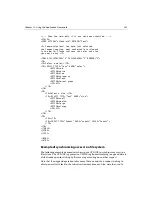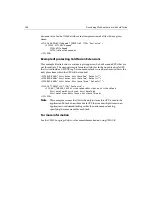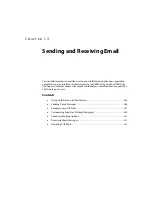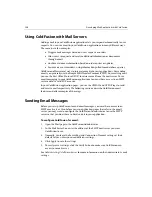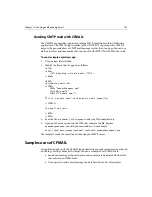
192
Developing Web Applications with ColdFusion
the client ID (CFID)and the client security token (CFTOKEN) between pages, either in
hidden form fields or appended to URLs. You accomplish this using the variable
Client.URLTOKEN or Session.URLTOKEN.
Note
In ColdFusion, client state management is explicitly designed to work
with cookies, the standard tool for identifying clients. Using client state
management without cookies requires careful programming to ensure
that the URLToken is always passed between application pages.
Getting a list of client variables
To obtain a list of the custom client parameters associated with a particular client, use
the GetClientVariablesList function.
<CFOUTPUT>#GetClientVariablesList()#</CFOUTPUT>
The GetClientVariablesList function returns a comma-separated list of variable names
defined for the application context declared by CFAPPLICATION, if any. The standard
system-provided client variables (CFID, CFToken, URLToken, HitCount, TimeCreated,
and LastVisit) are not returned in the list.
Deleting client variables
Unlike normal variables, client variables and their values persist over time. (In this
fashion they are akin to cookies.) To delete a client variable, use the
DeleteClientVariable function. For example:
<CFSET IsDeleteSuccessful=DeleteClientVariable("MyClientVariable")>
The DeleteClientVariable function operates only on variables within the scope
declared by CFAPPLICATION, if any. See the CFML Language Reference for more
information on this function.
Also, through the Variables page of the ColdFusion Administrator, you can edit the
client variable storage to remove client variables after a set number of days. (The
default value is 90 days when client variables are stored in the registry, ten days when
stored in a data source.)
See Administering ColdFusion Server for more information about setting time-out
values.
Note
The system-provided client variables (CFID, CFToken, URLToken,
HitCount, TimeCreated, and LastVisit) cannot be deleted.
Client variables with CFLOCATION behavior
When using CFLOCATION to redirect to a path that contains .DBM or .CFM, the
Client.URLToken is automatically appended to the URL. This behavior can be
suppressed by adding the attribute ADDTOKEN="No" to the CFLOCATION tag.
Содержание COLDFUSION 4.5-DEVELOPING WEB
Страница 1: ...Allaire Corporation Developing Web Applications with ColdFusion ColdFusion 4 5...
Страница 14: ...xiv Developing Web Applications with ColdFusion...
Страница 26: ...xxvi Developing Web Applications with ColdFusion...
Страница 34: ...8 Developing Web Applications with ColdFusion...
Страница 70: ...44 Developing Web Applications with ColdFusion...
Страница 84: ...58 Developing Web Applications with ColdFusion...
Страница 114: ...88 Developing Web Applications with ColdFusion...
Страница 148: ...122 Developing Web Applications with ColdFusion...
Страница 174: ...148 Developing Web Applications with ColdFusion...
Страница 208: ...182 Developing Web Applications with ColdFusion...
Страница 244: ...218 Developing Web Applications with ColdFusion...
Страница 274: ...248 Developing Web Applications with ColdFusion...
Страница 288: ...262 Developing Web Applications with ColdFusion...
Страница 300: ...274 Developing Web Applications with ColdFusion...
Страница 350: ...324 Developing Web Applications with ColdFusion...
Страница 362: ...336 Developing Web Applications with ColdFusion...


























